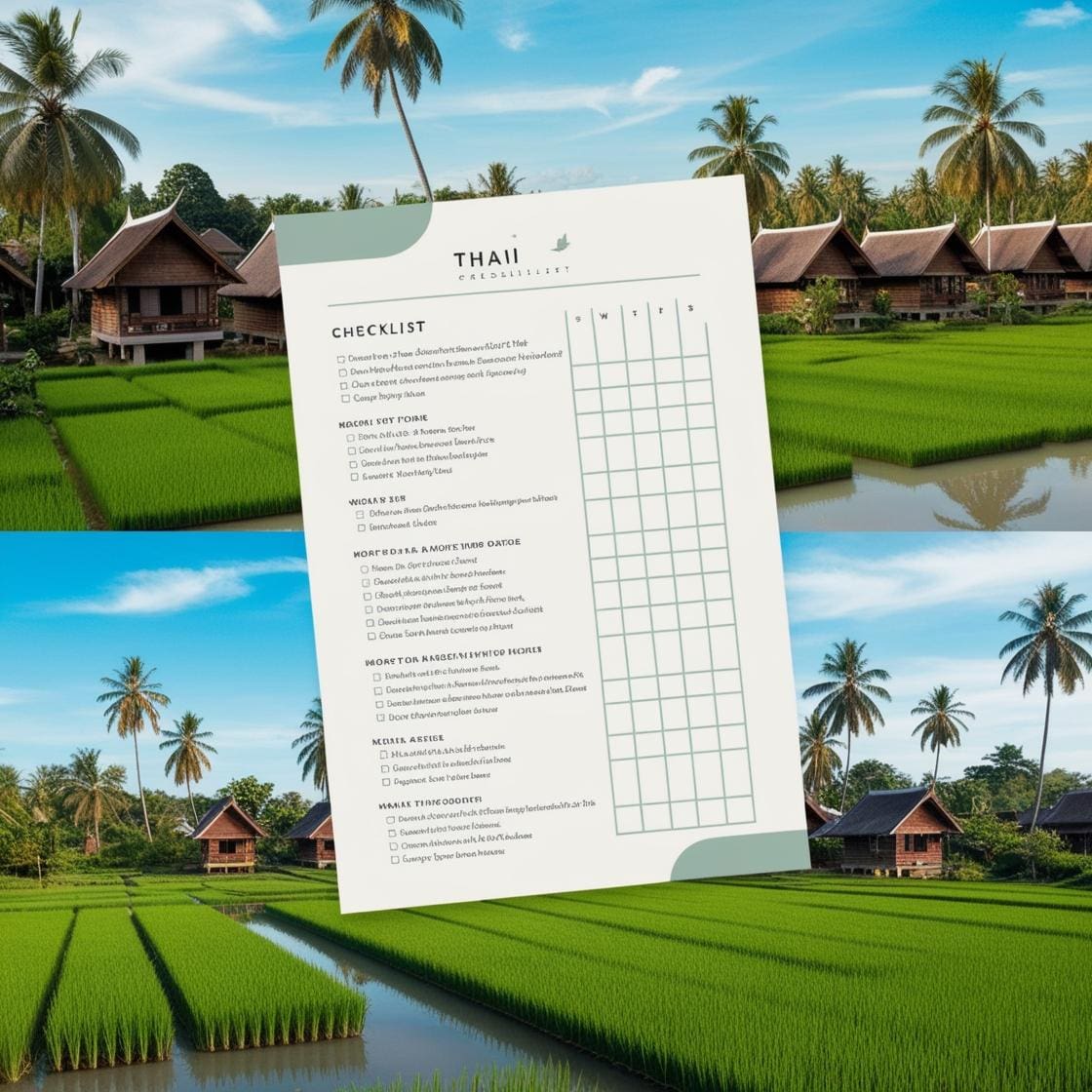Investing in real estate in Thailand can be both an exciting opportunity and a complex journey, especially for foreign buyers. Understanding the ins and outs of the market is crucial. This article provides The Complete Checklist for Buying Real Estate in Thailand, ensuring you have all the essential information needed to make informed decisions.
1. Understanding Thai Property Laws
Foreign Ownership Regulations
One of the first steps in The Complete Checklist for Buying Real Estate in Thailand is to familiarize yourself with the legal framework. Under Thai law, foreigners can own up to 49% of a condominium project but are generally restricted from owning land freehold. Instead, land can be acquired through leasehold agreements, typically lasting 30 years, with options for renewal.
Leasehold vs. Freehold
- Freehold: This type of ownership provides complete ownership of a property but is often limited to condominiums for foreigners.
- Leasehold: Foreigners can lease land for up to 90 years through renewals. This is a more common route for property ownership among non-nationals.
2. Defining Your Objectives
Investment vs. Personal Use
When crafting The Complete Checklist for Buying Real Estate in Thailand, clearly define your objectives. Are you purchasing for investment purposes, personal use, or both? This decision will guide your choices in property type and location.
Short-term vs. Long-term Goals
Consider your intended use of the property. Will it be a vacation rental or a long-term residence? Understanding your goals helps in selecting the right property strategy.
3. Choosing the Right Location
Urban vs. Rural Areas
Your checklist should include deciding between urban and rural settings. Thailand offers a wide array of environments, from the vibrant city life of Bangkok to the peaceful landscapes of Chiang Mai.
Popular Destinations
Research trending investment areas. For instance, locations like Phuket and Koh Samui are popular for their tourism appeal, which can enhance rental yields. Consider local amenities, accessibility, and community culture in your selection.
4. Setting a Budget
Purchase Price
Budgeting is a vital aspect of The Complete Checklist for Buying Real Estate in Thailand. Determine your financial limits and research average property prices. In Bangkok, central properties can range from THB 150,000 to 200,000 per square meter (around USD 4,500 to 6,000), while in Chiang Mai, prices average THB 60,000 to 80,000 per square meter (approximately USD 1,800 to 2,400).
Additional Costs
Be mindful of other expenses that come with buying property:
- Transfer fees: Generally about 2% of the appraised value.
- Stamp duty: Approximately 0.5% of the property value.
- Legal fees: Usually around 1-2% of the purchase price.
- Ongoing maintenance and management costs.
5. Engaging Professional Help
Real Estate Agents
Utilizing a reputable real estate agent is key to The Complete Checklist for Buying Real Estate in Thailand. They can provide insights into market trends and help you find properties that fit your criteria.
Legal Advisors
Engaging a local lawyer is essential for navigating the legal aspects of your purchase. They can assist with contract negotiations, ensuring compliance with local regulations and conducting thorough due diligence.
6. Conducting Due Diligence
Property Inspections
An important item on The Complete Checklist for Buying Real Estate in Thailand is conducting property inspections. Ensure you assess the property’s condition, checking for plumbing, electrical systems, and structural integrity. Consider hiring a professional inspector for a detailed evaluation.
Verifying Ownership
Confirm that the seller has clear ownership of the property. This involves examining the land title deed and ensuring there are no encumbrances or disputes regarding the property.
7. Financing Your Purchase
Cash Purchases
If you plan to buy outright, make sure your funds are readily available. Having a proof of funds document can streamline the process and strengthen your negotiating position.
Mortgages for Foreign Buyers
If you’re considering financing, research mortgage options available for foreigners. Some Thai banks offer loans to non-residents, but terms may vary significantly. Expect to provide documentation such as proof of income and credit history.
8. Making an Offer
Negotiation Strategies
When ready to make an offer, consider starting below the asking price to allow for negotiation. Be prepared to support your offer with market research and reasoning.
Understanding Contracts
Upon acceptance of your offer, ensure you thoroughly understand the contract terms, including payment schedules and contingencies. Your legal advisor can clarify any complex language.
9. Completing the Purchase
Necessary Documentation
Before concluding the purchase, gather all essential documents. This typically includes:
- The sale and purchase agreement.
- Title deed.
- Identification documents (passport, visa).
- Proof of funds or mortgage details.
Transfer Process
Ownership transfer generally occurs at the Land Office, where both parties will sign the necessary paperwork and pay fees. Ensure all documentation is processed accurately to avoid future legal issues.
10. Post-Purchase Considerations
Property Management
If you intend to rent out your property, consider hiring a property management company. They can handle tenant screening, maintenance, and compliance with local regulations, allowing you to enjoy passive income without the stress.
Tax Obligations
Understand your tax responsibilities as a property owner in Thailand. This includes property tax, income tax on rental earnings, and potential capital gains tax when selling. Consulting a tax advisor can help ensure compliance and optimize your tax strategy.
Conclusion
By following The Complete Checklist for Buying Real Estate in Thailand, you can navigate the complexities of the Thai property market with confidence. Whether you’re investing in a bustling city or a serene beach town, thorough preparation is key to making informed decisions. Take your time to research, consult professionals, and soon you’ll be on your way to owning a piece of Thailand.



